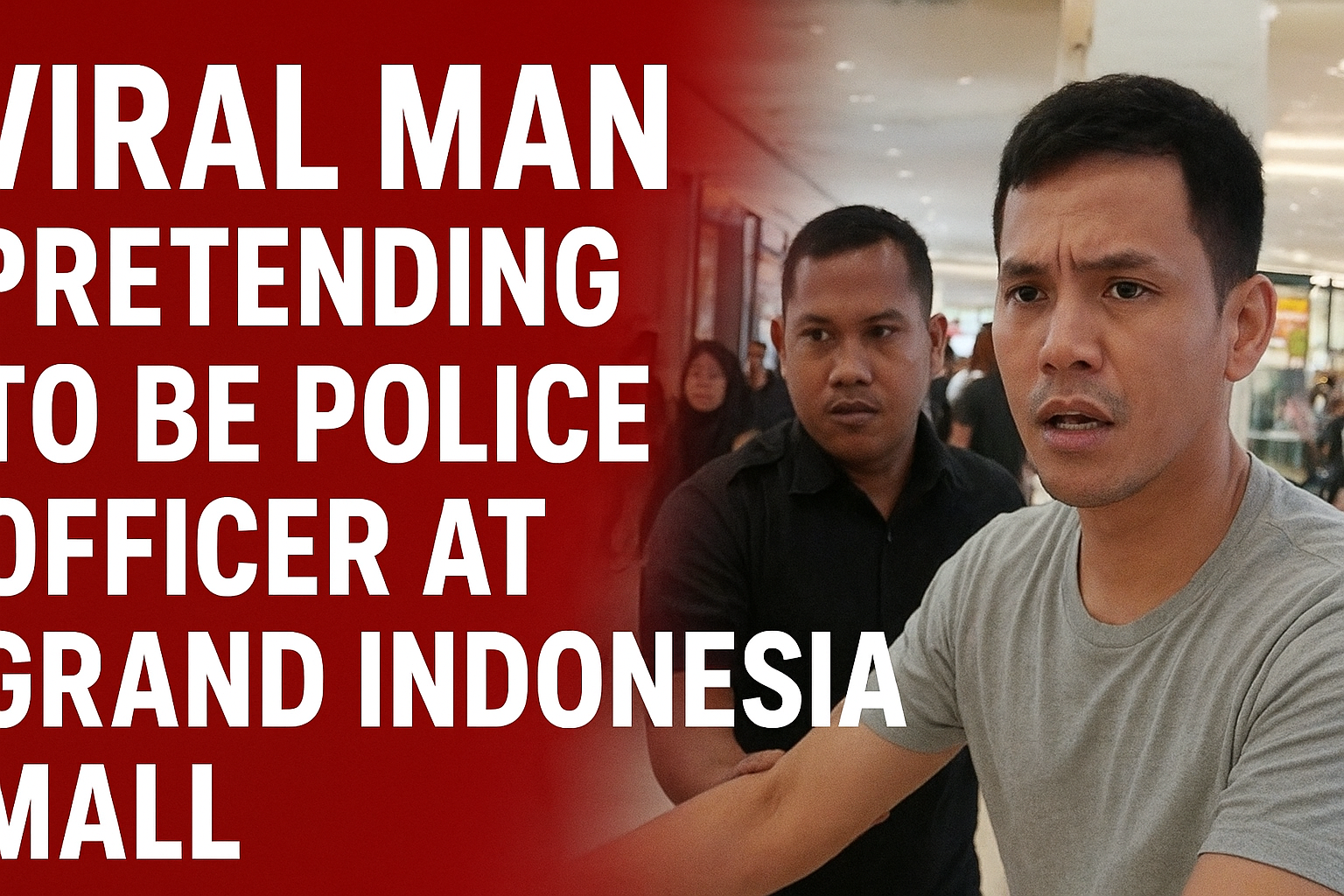Viral Incident at Grand Indonesia Mall – Man Pretending to Be a Police Officer
In early 2025, Indonesia’s social media landscape was shaken by a viral incident that took place at one of Jakarta’s most prestigious shopping centers — Grand Indonesia Mall. A man was caught on video impersonating a police officer, sparking outrage, confusion, and heated debates online. The incident quickly spread across platforms like TikTok, Instagram, Twitter (X), and YouTube, raising critical questions about public safety, impersonation crimes, and the credibility of law enforcement in Indonesia.
This article provides a comprehensive breakdown of the viral event, its timeline, the reactions it generated, the legal consequences of impersonating police officers, and the broader implications for Indonesian society.
What Happened at Grand Indonesia Mall?
On a seemingly ordinary weekend, mall visitors were shocked when a man dressed in casual clothing confronted several individuals while claiming to be a police officer. Eyewitnesses reported that the man’s tone was authoritative, demanding respect and compliance as if he had legitimate authority.
Shoppers who recorded the incident described the man’s behavior as aggressive and intimidating, yet strangely suspicious because he failed to show an official police ID.
The situation escalated when security personnel intervened, asking the man to clarify his identity. Instead of providing a valid explanation, he persisted in claiming to be a member of the police force. The confrontation was captured on video and soon spread like wildfire across social media.
The Viral Spread on Social Media
Within hours, the video of the “fake police officer at Grand Indonesia Mall” went viral. Here’s how it unfolded:
- TikTok: The video gained over 1 million views in less than 24 hours, with users flooding the comments section with disbelief, jokes, and criticisms.
- Instagram Reels: Influencers and meme pages reposted the clip, sparking memes about “instant police officers” and “DIY authority figures.”
- Twitter/X: Hashtags like #PolisiGadungan (Fake Police) and #GrandIndonesia trended nationwide, with netizens demanding action from authorities.
- YouTube: Several news channels and vloggers uploaded commentary and analysis, further fueling the story.
The viral nature of the event highlighted how digital platforms amplify local incidents into national controversies almost overnight.
Public Reaction: Between Anger and Humor
The public response was a mixture of outrage and amusement:
- Anger: Many Indonesians expressed frustration, arguing that impersonating a police officer undermines public trust in law enforcement.
- Fear: Some voiced concerns about how easily individuals could pretend to be police officers, potentially leading to scams, extortion, or abuse of power.
- Humor: On the lighter side, memes and jokes spread online, with some calling the man “the newest Netflix cop character” or comparing him to “street-level cosplay police.”
Despite the humorous takes, the underlying issue remained serious: impersonation is a crime, and it can have dangerous consequences.
Police and Official Response
The Jakarta Metropolitan Police quickly responded to the incident after it went viral. Authorities confirmed that the man was not an official member of the Indonesian National Police (Polri).
Spokespersons emphasized:
- Impersonating a police officer is a criminal offense under Indonesian law.
- Investigations were launched to determine the suspect’s motives and whether he had a history of similar behavior.
- The public was urged to remain vigilant and always request proper identification when confronted by anyone claiming to be law enforcement.
This response aimed to reassure the public that law enforcement integrity remains a top priority.
The Law on Impersonating Police Officers in Indonesia
Under Indonesian law, pretending to be an officer of the state is a punishable crime. Articles within the Indonesian Criminal Code (KUHP) specify that:
- Impersonation of government officials, including police, can result in imprisonment.
- Any act of intimidation, fraud, or extortion while impersonating an officer can lead to heavier penalties.
- The crime is not just about appearance but about misusing authority for personal gain or to intimidate others.
This incident serves as a reminder that impersonation is not a harmless prank—it is a direct threat to public trust and safety.
Why This Incident Went Viral
Several factors contributed to the virality of the Grand Indonesia case:
- Location: Grand Indonesia Mall is an elite shopping center in Jakarta, symbolizing urban lifestyle and social prestige.
- Context: Security and authority are sensitive topics in Indonesia, where the police often face scrutiny from the public.
- Visuals: The confrontation was dramatic and easily shareable on short-video platforms.
- Humor + Outrage Mix: The absurdity of a man boldly claiming to be police while clearly not having credentials made the story both funny and infuriating.
The Bigger Picture: Trust in Authority
Beyond the memes and outrage, this incident highlights deeper issues:
- Erosion of Trust: Fake officers can damage public perception of the police, especially if people struggle to distinguish between real and fake.
- Security Gaps: How did the man gain the confidence to impersonate an officer in such a public setting?
- Digital Accountability: Social media acts as a double-edged sword—exposing wrongdoing quickly but also risking trial-by-internet without due process.
Expert Opinions
Several criminologists and sociologists weighed in:
- Criminologists: Pointed out that impersonation is often linked to attempts at fraud, extortion, or personal validation.
- Sociologists: Argued that the case reflects a societal skepticism toward authority figures, where the public is quick to challenge legitimacy.
- Legal Experts: Stressed the importance of strengthening awareness campaigns so that citizens know how to verify an officer’s identity.
Timeline of the Incident
- Afternoon at Grand Indonesia: The man begins asserting himself as a police officer.
- Confrontation Recorded: Bystanders film the scene as security intervenes.
- Viral Uploads: Videos spread across multiple platforms within hours.
- Public Reaction Explodes: Outrage, memes, and debates dominate online spaces.
- Police Response: Authorities confirm the man is not an officer and launch an investigation.
Lessons Learned
This viral case carries valuable lessons for both the public and authorities:
- Always ask for official identification when approached by someone claiming to be a police officer.
- Mall security and private institutions need stricter verification procedures.
- Authorities must improve public communication to prevent fear and confusion.
- Citizens should remember that while memes are entertaining, impersonation crimes are serious offenses.
Broader Context: Impersonation Crimes in Indonesia
This is not the first time impersonation incidents have gone viral in Indonesia:
- In previous years, several cases of fake military officers attempting to scam civilians were reported.
- There have been scams involving people posing as government officials to extract money.
- These cases underline the need for stricter enforcement and public education campaigns.
The Grand Indonesia case, however, stood out because of its high-profile location and the explosive reach of social media.
Media Coverage and Public Debate
Mainstream media outlets covered the incident extensively, with headlines like:
- “Man Posing as Police Causes Chaos at Grand Indonesia Mall.”
- “Jakarta Shoppers Shocked by Fake Officer Incident.”
Television talk shows and podcasts also picked up the story, sparking debates about authority, social media culture, and law enforcement accountability.
International Attention
Interestingly, the story even caught the attention of foreign media, which reported it as an example of how Southeast Asia grapples with impersonation scams and viral justice culture.
This global coverage reinforced how local incidents can become part of international discourse when amplified online.
Conclusion
The viral incident of a man impersonating a police officer at Grand Indonesia Mall was more than just a social media spectacle. It revealed the fragility of public trust, the dangers of impersonation crimes, and the power of viral culture in shaping narratives.
While many laughed at the absurdity, the legal and social consequences remain serious. The event serves as a wake-up call for Indonesians to remain cautious, demand proper identification from authority figures, and ensure that law enforcement continues building credibility with the public.




